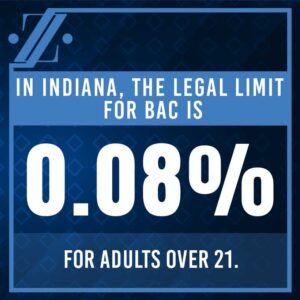Understanding DUI Offenses
Driving under the influence (DUI) is a serious offense with significant legal, financial, and personal consequences. At Zentz Law, understanding DUI offenses is crucial, and we’re committed to empowering you with the knowledge and support you need to navigate the complexities of DUI laws in Indiana, while understanding DUI offenses
We fight for your family’s future. Being informed is the first step toward protecting yourself in DUI cases and understanding the potential severe consequences. Contact us today at 317-220-6156.
What Is a DUI?
 Driving Under the Influence (DUI) occurs when an individual operates a motor vehicle with a blood alcohol concentration (BAC) at or above the legal threshold. In Indiana, the legal limit for BAC is 0.08% for adults over 21. For commercial drivers, it’s 0.04%, and for those under 21, any detectable amount of alcohol can result in DUI charges. It’s crucial to understand that blood alcohol levels can vary due to factors like the number of drinks consumed, food intake, and time since drinking.
Driving Under the Influence (DUI) occurs when an individual operates a motor vehicle with a blood alcohol concentration (BAC) at or above the legal threshold. In Indiana, the legal limit for BAC is 0.08% for adults over 21. For commercial drivers, it’s 0.04%, and for those under 21, any detectable amount of alcohol can result in DUI charges. It’s crucial to understand that blood alcohol levels can vary due to factors like the number of drinks consumed, food intake, and time since drinking.
When unsure of your BAC, you should avoid operating motorized vehicles to prevent potential DUI incidents. It’s important to note that a DUI charge can also apply to driving under the influence of drugs, including both illegal substances and certain prescription medications. Additionally, you can be charged with a DUI even if you’re below the legal BAC limit if law enforcement determines that your ability to drive safely is impaired.
Why You Need a DUI Attorney
Facing DUI charges can be overwhelming and confusing. A skilled DUI attorney, like those at Zentz Law in Indiana, can make a huge difference in your case. They understand the complex legal system, know how to challenge evidence, and can negotiate with prosecutors for better outcomes. Without proper legal help, you might miss important details or defense strategies that could significantly impact your case. An experienced attorney can also guide you through your sentencing options and help minimize the long-term consequences of a DUI charge.
At Zentz Law, we’re committed to protecting your rights and working toward the best possible result for your situation.
Don’t face DUI charges alone, get the legal guidance support you need to navigate this challenging time. Call us today at 317-220-6056.
DUI Laws and Legal Thresholds
Understanding DUI laws is essential for avoiding impaired driving and ensuring you can safely operate a vehicle.
Indiana’s DUI laws are strict and cover a range of behaviors and BAC levels such as:
- Adults (21+): BAC of 0.08% or higher
- Commercial drivers: BAC of 0.04% or higher
- Underage drivers (under the legal drinking age): Any detectable amount of alcohol
The state has a zero-tolerance policy for underage drinking and driving. Exceeding these legal thresholds can lead to a DUI charge and severe penalties.
Consequences of a DUI
The consequences of DUI charges can be severe and long-lasting. They often depend on factors such as prior DUI convictions and aggravating circumstances like accidents or injuries.
Here’s an overview of potential DUI penalties:
First Offense
- Fines up to $500
- License suspension for up to 180 days
- Up to one year in jail
Second Offense
- Higher fines and court costs
- License suspension for up to two years
- Mandatory attendance in alcohol education programs
- Increased jail time
Third and Subsequent Offenses
- Substantial fines
- Extended jail time
- Permanent license revocation
- Mandatory installation of an ignition interlock device
It’s important to note that repeat offenders face increasingly severe penalties. Multiple DUI convictions can lead to felony DUI charges, resulting in more severe consequences within the criminal justice system.
The DUI Arrest Process
Understanding the DUI arrest process is crucial for anyone facing DUI charges.
Here’s what typically happens during a DUI incident:
- Initial traffic stop: A police officer may pull you over for erratic driving or other traffic violations.
- Field sobriety tests: Law enforcement officers may conduct these tests to assess impairment. These field sobriety tests can include various tasks to prove you’re not impaired.
- Breathalyzer tests: Used to measure BAC. Refusal can result in immediate license suspension.
Rights During a DUI Arrest
Even during a DUI arrest, you have important legal obligations and rights:
- Right to remain silent: You’re not required to answer incriminating questions.
- Right to an attorney: Legal representation is vital during questioning and subsequent legal proceedings.
- Consequences of refusing a breathalyzer: Refusal can lead to immediate penalties, including license suspension.
Legal Consequences of a DUI Conviction
DUI convictions have serious consequences that can affect various aspects of your life including:
Criminal Record
A DUI conviction becomes part of your criminal record, potentially impacting:
- Employment opportunities
- Professional licenses
Financial Consequences
- Fines and court costs
- Increased insurance premiums
- Costs of mandatory programs and interlock devices
Defending Against a DUI Charge
If you’re facing a DUI charge, several defense strategies can be employed:
- Challenging the traffic stop: Questioning the legality of the initial stop.
- Questioning breathalyzer accuracy: Examining the calibration and administration of the test.
- Examining field sobriety test administration: Assessing whether tests were conducted properly.
Role of a DUI Attorney
Having an experienced DUI attorney is crucial when navigating the complex legal process of DUI cases.
A qualified attorney can:
- Provide legal guidance
- Negotiate plea deals
- Challenge evidence
- Work toward a favorable outcome
An attorney can also help you understand your legal obligations and explore other sentencing options if available.
Preventing DUI Offenses
The best way to avoid the serious consequences of a DUI is to prevent it from happening:
- Plan ahead: Use a designated driver when consuming alcohol.
- Utilize ride-sharing services: Services like Uber and Lyft provide safe transportation.
- Be aware of personal limits: Know how alcohol affects you and make responsible decisions.
DUI Education Programs
Mandatory alcohol education programs play a vital role in preventing repeat offenses:
- Benefits of attendance: Programs provide valuable information and tools to prevent future DUIs.
- Overview of available programs: Information on local programs and their benefits.
These programs are often part of the sentencing for DUI offenders and aim to reduce recidivism.
DUI and Special Circumstances
A DUI offense involving accidents or injuries carries additional penalties:
- Aggravating factors: Harsher consequences for causing harm while under the influence.
- Legal repercussions for vehicular manslaughter: Severe legal consequences if a DUI results in death.
A DUI motor vehicle accident resulting in injury or death can elevate the DUI charge to a felony offense, leading to more severe criminal penalties.
DUI and Minors
Special laws and harsher penalties apply to underage DUI offenders:
- Specific laws and penalties: Zero-tolerance policy for underage drinking and driving.
- Long-term impact: Potential consequences of an underage DUI conviction can be long term.
Underage DUI convictions can have lasting effects on a young person’s future, including impacts on education and career opportunities.
Alternative Sentencing Options
In some impaired driving cases, alternative sentencing options may be available:
- Community service: Judges may order community service as part of the sentence.
- Probation: Supervised release instead of jail time.
- Treatment programs: Mandatory participation in alcohol or drug treatment programs.
These alternatives aim to address the underlying issues contributing to DUI behavior while still holding repeat offenders accountable.
Felony DUI Charges
Certain circumstances can elevate a DUI to a felony offense:
- Multiple prior convictions: Typically, a third or fourth DUI offense becomes a felony.
- DUI resulting in injury or death: A DUI accident causing serious injury or death is often charged as a felony.
- High BAC levels: Extremely high BAC levels may lead to felony charges, even for first-time offenders.
Felony charges carry more severe penalties, including longer jail sentences and higher fines. They also have more significant long-term impacts on employment and personal rights.
Understanding the DUI Legal Process


- Arrest and booking: The initial arrest and processing at the police station.
- Arraignment: The first court appearance where charges are formally presented.
- Pre-trial motions: Lawyers may file motions to suppress evidence or dismiss charges.
- Plea bargaining: Negotiations between the defense and prosecution for a plea deal.
- Trial: If a plea agreement isn’t reached, the case goes to trial.
- Sentencing: If found guilty, the judge determines the appropriate penalties.
Each stage of this process requires careful navigation, emphasizing the importance of experienced legal support.
Impact on Driving Privileges
A DUI conviction can significantly affect your driving privileges:
- License suspension: Immediate suspension upon arrest, with longer suspensions if convicted.
- Restricted licenses: Possibility of obtaining a restricted driver’s license for essential travel.
- Ignition interlock devices: Many states require these devices for convicted DUI offenders.
Reinstating your full driving privileges often involves completing all court-ordered requirements and paying reinstatement fees.
Long-Term Consequences of DUI Convictions
The effects of a DUI conviction can extend far beyond the initial legal penalties:
- Employment challenges: Many employers conduct background checks and may be hesitant to hire individuals with prior convictions.
- Housing issues: Landlords may screen for criminal records, potentially affecting housing options.
- Travel restrictions: Some countries may deny entry to individuals with a DUI conviction.
- Personal relationships: The stress and stigma of a DUI can strain personal and professional relationships.
Understanding these long-term impacts underscores the importance of taking DUI charges seriously and seeking proper legal assistance.
Aggravating Factors in DUI Cases


- Previous DUI convictions: A previous DUI conviction can significantly increase penalties.
- High BAC levels: Blood alcohol concentration (BAC) levels well above the legal limit may result in an enhanced drunk driving charge.
- Presence of minors: Driving under the influence with a minor in the vehicle is a criminal offense.
- Causing accidents or injuries: Incidents of driving under the influence resulting in accidents, injuries, or property damage face other potential consequences.
These aggravating circumstances can turn a misdemeanor DUI into a felony charge, leading to more severe legal penalties and long-term consequences.
The Role of Blood Alcohol Concentration (BAC)
Understanding BAC is crucial in DUI cases:
- Legal limits: As mentioned earlier, the legal BAC limit varies depending on age and type of driver’s license.
- Testing methods: BAC can be measured through breath, blood, or urine tests.
- Factors affecting BAC: Body weight, gender, metabolism, and food consumption can all impact BAC levels.
Challenging BAC evidence is a common defense strategy in DUI cases, often focusing on the accuracy of testing methods or the proper administration of tests.
The Importance of Legal Support
Given the complex nature of DUI laws and the legal consequences, seeking legal assistance is crucial.
An experienced attorney can:
- Analyze the details of your case
- Identify potential defense strategies
- Navigate the legal system on your behalf
- Negotiate with prosecutors for reduced charges or alternative sentencing
- Represent you in court if necessary
With the right legal support, you may be able to achieve a more favorable outcome in your DUI case.
FAQs
Here are answers to some common questions about DUI offenses:
How long does a DUI stay on your record in Indiana?
Typically, a DUI remains on your record for life.
Can a DUI be expunged in Indiana?
Expungement is possible under certain conditions, usually involving a waiting period and fulfilling all sentencing requirements.
What’s the difference between DUI and OWI in Indiana?
DUI refers to driving under the influence, while OWI encompasses operating a vehicle while intoxicated by alcohol or drugs.
What are the costs associated with a DUI conviction?
Costs can include fines, court fees, increased insurance premiums, and expenses for mandatory education programs or interlock devices. These can lead to a financial burden for the convicted driver.
What is the legal drinking age?
A person must be 21 years or older to drink alcohol.
Contact a Qualified DUI Attorney at Zentz Law


At Zentz Law, we’re dedicated to your defense and well-being. We empower you with strategic solutions to win your case, fueled by our fierce determination. If you’re facing impaired driving or DUI charges, contact us for a consultation. Our determination, defense strategies, and unwavering support will ensure you receive the best possible defense. We are a legal powerhouse in the courtroom. Remember, taking proactive measures and seeking appropriate legal representation can make a significant difference in the outcome of your case.
For a free consultation to discuss impaired driving defense strategies, call 317-220-6056 today.


